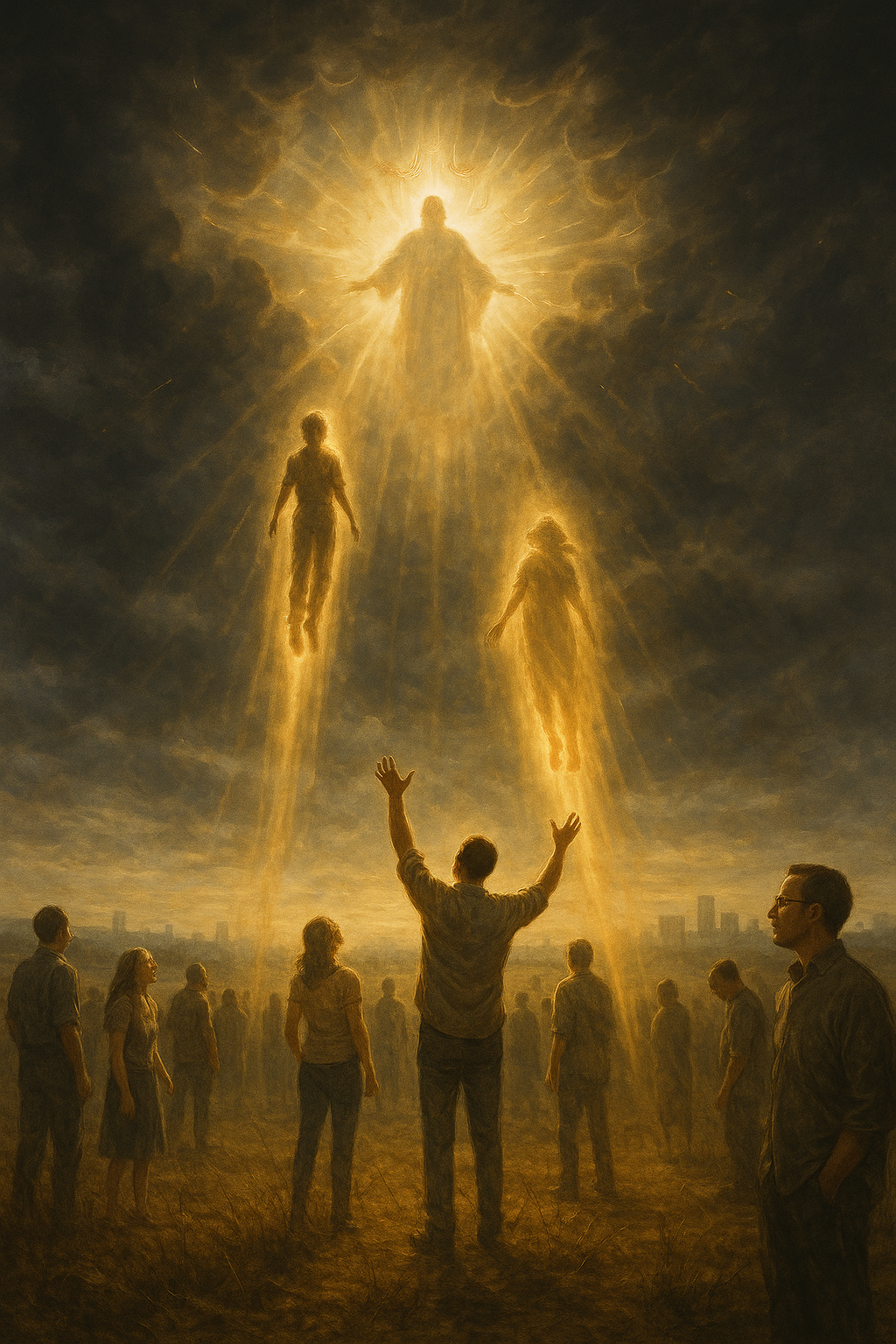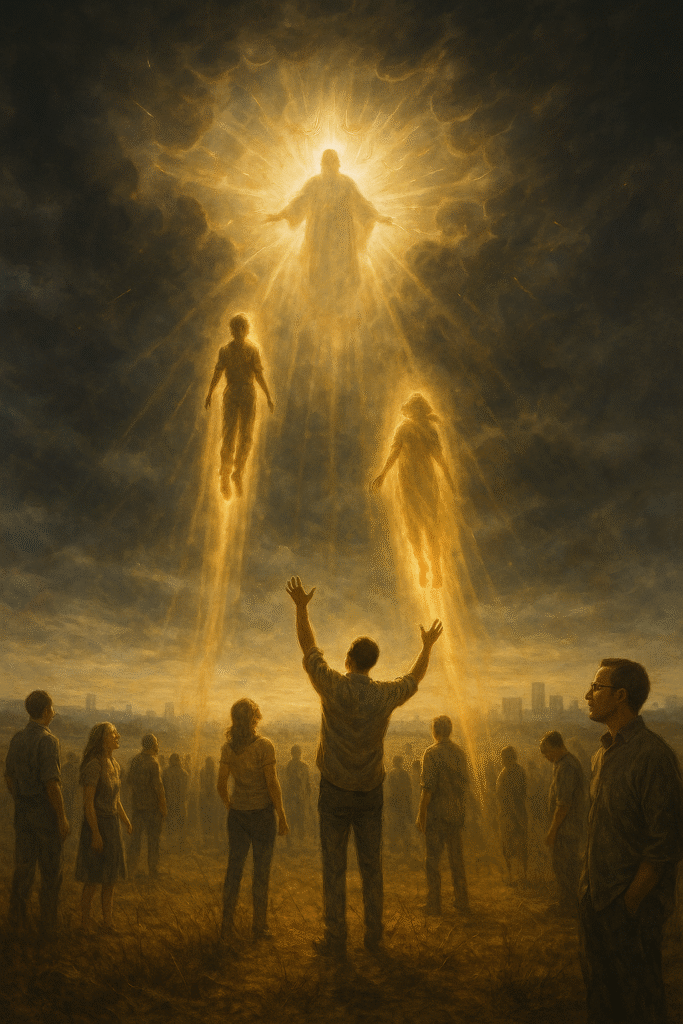Physical Address
304 North Cardinal St.
Dorchester Center, MA 02124
Physical Address
304 North Cardinal St.
Dorchester Center, MA 02124
With Michael Walker
With Michael Walker

A message to the distracted…

There is something hauntingly beautiful and weighty about the subject of the rapture. The very word carries a sense of mystery and longing, and yet it is not a word you will ever find in the pages of Scripture. What you will find is something far more sobering, far more demanding of thought and reflection. To speak of the rapture is to speak of being caught up, of being seized, of the Messiah calling His people to Himself in the most decisive and irreversible moment in human history. But before rushing to predict dates or craft timetables, we must first step back and take in the wider landscape. This is not about sensational predictions. This is about the bigger picture, and that bigger picture reveals a serious reality check for anyone with ears to hear.
The Scriptures do not leave us without direction on this matter. The Messiah Himself gave the hinge point upon which the entire conversation hangs: “This gospel of the kingdom shall be preached in the whole world as a witness to all the nations, and then the end will come” (Matthew 24:14). That is not a vague sentiment; it is a concrete marker. The end, and by implication the catching up of His people, does not precede this proclamation but follows it. That is the baseline, and yet even here many are quick to confuse the signs of the end with the culmination itself. Wars, famines, earthquakes, cosmic disturbances — these are signals, yes, but they are not the trumpet call that gathers the elect. Confusing the two is like mistaking the rumble of distant thunder for the flash of lightning that splits the sky.
The biblical picture of the rapture is not tied to the word itself but to the phrase “caught up,” the Greek harpazō, which means to seize or snatch away. Paul paints this picture in his first letter to the Thessalonians: “But we do not want you to be uninformed, brothers and sisters, about those who are asleep, so that you will not grieve as indeed the rest of mankind do, who have no hope. For if we believe that Yehoshua died and rose from the dead, so also God will bring with Him those who have fallen asleep through Yehoshua. For we say this to you by the word of the Lord, that we who are alive and remain until the coming of the Lord, will not precede those who have fallen asleep. For the Lord Himself will descend from heaven with a shout, with the voice of the archangel, and with the trumpet of God, and the dead in the Messiah will rise first. Then we who are alive, who remain, will be caught up together with them in the clouds to meet the Lord in the air, and so we will always be with the Lord. Therefore, comfort one another with these words” (1 Thessalonians 4:13–18). The description is clear and majestic — a shout, a trumpet, a catching up, and a reunion.
Paul echoes this mystery again in his first letter to the Corinthians: “Now I say this, brothers and sisters, that flesh and blood cannot inherit the kingdom of God; nor does the perishable inherit the imperishable. Behold, I am telling you a mystery; we will not all sleep, but we will all be changed, in a moment, in the twinkling of an eye, at the last trumpet; for the trumpet will sound, and the dead will be raised imperishable, and we will be changed. For this perishable must put on the imperishable, and this mortal must put on immortality. But when this perishable puts on the imperishable, and this mortal puts on immortality, then will come about the saying that is written: ‘Death has been swallowed up in victory’” (1 Corinthians 15:50–54). The language of sudden transformation and the sounding of the last trumpet ties directly into the same event. This is not about gradual improvement but instantaneous change. It is as if mortality itself will be peeled away like an old garment, revealing a body made for eternity.
The Messiah Himself confirmed this in His promises to His disciples: “Do not let your heart be troubled; believe in God, believe also in Me. In My Father’s house are many rooms; if it were not so, I would have told you, because I am going there to prepare a place for you. And if I go and prepare a place for you, I am coming again and will take you to Myself, so that where I am, there you also will be” (John 14:1–3). The promise was not vague comfort but a personal assurance: He will come again, and He will receive His people to Himself. Matthew records this gathering with greater cosmic weight: “But immediately after the tribulation of those days, the sun will be darkened, and the moon will not give its light, and the stars will fall from the sky, and the powers of the heavens will be shaken. And then the sign of the Son of Man will appear in the sky, and then all the tribes of the earth will mourn, and they will see the Son of Man coming on the clouds of the sky with power and great glory. And He will send forth His angels with a great trumpet blast, and they will gather together His elect from the four winds, from one end of the sky to the other” (Matthew 24:29–31). Cosmic upheaval and angelic gathering mark this climactic moment.
Luke echoes this with stark imagery: “I tell you, on that night there will be two people in one bed; one will be taken and the other will be left. There will be two women grinding grain at the same place; one will be taken and the other will be left” (Luke 17:34–35). Here the imagery shifts from cosmic signs to the intimacy of daily life disrupted in an instant. One moment everything is ordinary; the next, separation as final as death itself.
This idea of being taken up or caught up has precedent in Scripture. Enoch “walked with God; and he was not, for God took him” (Genesis 5:24). Elijah “went up by a whirlwind to heaven” in a chariot of fire (2 Kings 2:11). These are not poetic metaphors but recorded removals of the righteous. Daniel speaks of the same hope tied to the end of days: “Now at that time Michael, the great prince who stands guard over the sons of your people, will arise. And there will be a time of distress such as never occurred since there was a nation until that time; and at that time your people, everyone who is found written in the book, will be rescued. And many of those who sleep in the dust of the ground will awake, these to everlasting life, but the others to disgrace and everlasting contempt. And those who have insight will shine like the bright expanse of heaven, and those who lead the many to righteousness, like the stars forever and ever” (Daniel 12:1–3). Even Isaiah speaks of the trumpet: “On that day the Lord will thresh from the flowing stream of the Euphrates River to the brook of Egypt, and you will be gathered up one by one, sons of Israel. It will come about also on that day that a great trumpet will be blown, and those who were perishing in the land of Assyria and who were scattered in the land of Egypt will come and worship the Lord on the holy mountain in Jerusalem” (Isaiah 27:12–13). The foreshadows align with the promises.
But here is where the conversation must shift. Because while people rush to speculate about timing, they often miss the deeper issue. The gospel that has been spread across the earth is not the covenant gospel. What has gone global is the counterfeit gospel under the substitute name Jesus, carried by Christianity, and it has already reached into nearly every nation, funded by billions and even trillions. But that is not the true witness Yehoshua spoke of. The true gospel is not merely words of forgiveness. It is the gospel of the cure, under the covenant Name Yehoshua, carrying embedded authority of salvation, healing, and covenantal truth, and embodying the function of the Godhead in demonstration of power. This gospel has not yet reached the four corners of the earth. It is not the gospel of words but of demonstration, not a gospel of substitute names but the gospel of the covenant Name. From a natural and logical point of view, this means the rapture is not imminent. The marker of Matthew 24:14 has not been fulfilled in its covenant fullness.
Think of it like medicine. A counterfeit pill may look the same, be sold everywhere, and even be prescribed by respected doctors, but if it does not contain the cure, it will not heal. The counterfeit gospel of Christianity has already saturated the globe, but its active ingredient is missing. The gospel of Yehoshua, the cure, is the only one with the true formula — and it has not yet been distributed to every nation. Until that happens, the prescription for the end cannot be filled.
This means that from a natural perspective, the rapture is not happening any time soon. Only Yahweh can accelerate the timeline, and He may choose to compress events, but the logic of the Scriptures makes clear that speculation about immediacy is misplaced. The real dividing line is not the timing of the event but the readiness of the person. Because what is the point of the rapture if you will not be caught up in it?
This is where the mirror must be held up. Instead of always looking up, hoping for escape, people should be looking within. Is the covenant Name Yehoshua written upon you? Has the cure entered your blood and your being? Do you walk in the demonstration of the Godhead’s power, or do you simply nod at the substitute gospel of Christianity? To speculate on dates while ignoring your own state is like staring at the departure board in an airport without ever buying a ticket. When the plane takes off, you will still be standing in the terminal.
So in conclusion, this is not a prediction but a reality check. From a natural perspective, the rapture most likely is not happening for a while. But the real issue is not timing but alignment. The rapture will happen, but when it does, not everyone will be caught up. And if you are not caught up, it does not matter if it is today or ten thousand years from now. Instead of asking when, you must ask who. And instead of staring endlessly at the sky, perhaps it is time to look into the mirror of the Word and ask yourself the only question that matters: when the trumpet sounds, will you be the one taken, or the one left behind?